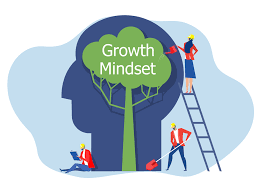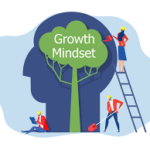Introduction
A growth mindset is the belief that abilities and intelligence can be developed through dedication, hard work, and learning. This mindset contrasts with a fixed mindset, where individuals believe their talents and abilities are static traits. Embracing a growth mindset transforms challenges into opportunities for growth and learning, paving the way for personal and professional success. In this comprehensive guide, we’ll explore how to develop a growth mindset and harness the power of challenges to achieve your goals.
Understanding Growth Mindset
Definition
A growth mindset is the belief that abilities and intelligence can be developed through effort, perseverance, and dedication. This concept, popularized by psychologist Carol Dweck, emphasizes the potential for growth and improvement in every individual.
Origins
The concept of growth mindset originated from Carol Dweck’s research on achievement and success. Her studies revealed that individuals with a growth mindset are more likely to embrace challenges and persist through difficulties compared to those with a fixed mindset.
Importance
Adopting a growth mindset is crucial for personal and professional development. It encourages continuous learning, resilience, and adaptability, all of which are essential for overcoming obstacles and achieving long-term success.
Fixed Mindset vs. Growth Mindset
Key Differences
- Fixed Mindset: Belief that abilities are static and unchangeable. Individuals with a fixed mindset avoid challenges, give up easily, and view effort as fruitless.
- Growth Mindset: Belief that abilities can be developed through effort and learning. Individuals with a growth mindset embrace challenges, persist through difficulties, and view effort as a path to mastery.
Impact on Success
A growth mindset leads to higher levels of achievement and resilience. Individuals with this mindset are more likely to take risks, learn from their mistakes, and continuously improve, ultimately leading to greater success in various areas of life.
Benefits of a Growth Mindset
Personal Growth
A growth mindset fosters personal development by encouraging individuals to seek out new experiences, learn from their failures, and continuously strive for improvement. It leads to greater self-awareness, confidence, and emotional intelligence.
Professional Development
In the workplace, a growth mindset drives innovation, productivity, and collaboration. Employees who believe in their ability to grow are more likely to take initiative, seek feedback, and contribute to a positive and dynamic work environment.
The Science Behind Growth Mindset
Neuroplasticity
Neuroplasticity refers to the brain’s ability to reorganize itself by forming new neural connections throughout life. This concept supports the idea that we can develop new skills and abilities through practice and effort, reinforcing the growth mindset.
Psychological Research
Studies have shown that individuals with a growth mindset are more resilient in the face of setbacks, more motivated to learn, and more likely to achieve their goals. These findings highlight the importance of mindset in determining success and well-being.
Self-Awareness and Mindset
Identifying Your Current Mindset
Self-awareness is the first step in developing a growth mindset. Reflect on your beliefs about intelligence and abilities. Do you see them as fixed traits, or do you believe they can be developed? Identifying your current mindset will help you understand where you need to make changes.
Self-Reflection
Engage in regular self-reflection to evaluate your progress and mindset. Consider journaling about your experiences, challenges, and how you respond to them. This practice will help you identify patterns and areas for improvement.
Embracing Challenges
Viewing Challenges Positively
Challenges are opportunities for growth and learning. Instead of avoiding them, embrace challenges as a chance to develop new skills and improve. Viewing challenges positively can transform your approach to obstacles and setbacks.
Overcoming Fear
Fear of failure often prevents individuals from taking on new challenges. Confront your fears by breaking them down into manageable steps and focusing on the potential for growth and learning rather than the possibility of failure.
Learning from Failure
Importance of Failure
Failure is a natural part of the learning process. It provides valuable feedback and insights that can help you improve and grow. Embrace failure as an essential step toward success.
Reframing Failure
Reframe failure as a learning opportunity rather than a setback. Analyze what went wrong, identify areas for improvement, and apply these lessons to future endeavors. This mindset shift will help you bounce back stronger and more resilient.
Developing Resilience
Building Emotional Strength
Resilience is the ability to recover from setbacks and adapt to challenging circumstances. Building emotional strength involves developing coping strategies, maintaining a positive outlook, and staying motivated despite difficulties.
Coping Strategies
Effective coping strategies include mindfulness, seeking social support, and engaging in physical activities. These practices can help you manage stress and maintain a positive mindset.
Cultivating Curiosity
Lifelong Learning
A growth mindset thrives on curiosity and a love for learning. Cultivate a habit of lifelong learning by exploring new subjects, seeking out new experiences, and continuously challenging yourself to grow.
RELATED: Finding Your Purpose: Strategies to Discover Your Passions and Live a Fulfilling Life
Asking Questions
Ask questions to deepen your understanding and expand your knowledge. Curiosity drives learning and innovation, helping you develop new skills and insights.
Setting Growth-Oriented Goals
SMART Goals
Set SMART goals that are Specific, Measurable, Achievable, Relevant, and Time-bound. This framework ensures that your goals are clear, attainable, and aligned with your growth objectives.
Stretch Goals
Stretch goals push you beyond your comfort zone and challenge you to reach higher levels of performance. While ambitious, they should still be realistic and achievable with effort and persistence. developing a growth mindset
Seeking Feedback and Criticism
Constructive Feedback
Constructive feedback provides valuable insights into your performance and areas for improvement. Seek feedback from mentors, peers, and supervisors to enhance your growth and development.
Personal Growth
View feedback as an opportunity for personal growth rather than criticism. Use it to identify strengths, address weaknesses, and continuously improve your skills and abilities.
Building a Support System
Mentors
Mentors provide guidance, support, and valuable insights based on their experiences. Seek out mentors who can help you navigate challenges and achieve your goals.
Peer Support
Surround yourself with like-minded individuals who share your commitment to growth and learning. Peer support can provide encouragement, motivation, and accountability. developing a growth mindset
Mindfulness and Growth Mindset
Benefits of Mindfulness
Mindfulness enhances self-awareness, reduces stress, and improves focus and resilience. Practicing mindfulness can support the development of a growth mindset by helping you stay present and engaged in the learning process.
Practices to Adopt
Incorporate mindfulness practices into your daily routine, such as meditation, deep breathing, and mindful walking. These practices can help you stay grounded and maintain a positive mindset.
Overcoming Self-Doubt
Building Confidence
Confidence is essential for embracing challenges and pursuing growth. Build confidence by celebrating your achievements, practicing self-compassion, and taking incremental steps toward your goals.
Positive Affirmations
Use positive affirmations to reinforce your belief in your abilities and potential for growth. Affirmations can help counteract self-doubt and build a stronger, more positive mindset. developing a growth mindset
Adapting to Change
Flexibility
A growth mindset involves being open to change and willing to adapt. Embrace new experiences and be flexible in your approach to challenges and opportunities.
Embracing New Experiences
Seek out new experiences and opportunities to learn and grow. Embracing change can lead to personal and professional development and open up new possibilities.
Inspiring Growth Mindset Stories
Real-life Examples
Study real-life examples of individuals who have demonstrated a growth mindset. These stories can provide valuable insights and inspiration for your own journey. developing a growth mindset









